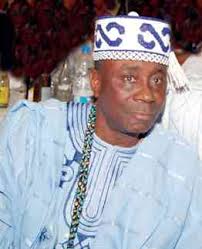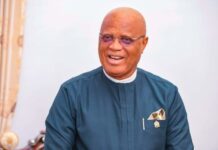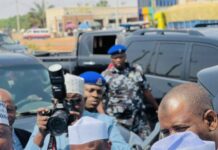Traditional rulers are gradually but increasingly getting involved in political activities under various guises, even as they are expected to be neutral, Editor, Politics/Features, EMEKA ALEX DURU, writes.

A major issue that was readily thrown up by the controversial remarks credited to the Oba of Lagos, Rilwanu Akiolu, last week, was the confirmation of the increasing involvement of traditional rulers in political activities in their various domains. This is even as the royal fathers are not expected to show open partisanship in political affairs in the country.
The Lagos monarch had, in a widely reported directive, ordered a gathering of Eze Ndigbo (honorary Igbo traditional rulers) of all the local government areas in Lagos State to ensure that their people cast their votes for his chosen governorship candidate in Saturday, April 11 governorship election or “perish inside the lagoon”.
“On Saturday, if anyone of you goes against the Ambode I picked, that is your end. If it doesn’t happen within seven days, just know that I’m a bastard and it is not my father who gave birth to me,” the Oba told the gathering.
Akiolu was a staunch supporter of Akinwunmi Ambode, the candidate of the All Progressives Congress (APC) in the governorship contest, and had not concealed the fact. In fact, more than a year to the APC primary, the royal father had announced that Ambode would fly the flag of the party in the election. Even when his audacious intervention had caused frictions within the ruling party in the state, he stuck to his gun, sniggering that any contender who dared the choice candidate would merely be wasting his time and money.
In making the announcement, Akiolu indicated that Ambode was the choice of the decision-makers in the state. Not few aspirants in APC took his cocky position on the issue lightly. But he swaggered on, unperturbed. However, sensing that the early disclosure of the Ambode candidature would affect its cohesion in the state, the party rolled out a statement in which it claimed that the Oba spoke for himself.
With time, however, it gradually became apparent that the royal father was not on ego trip after all. Ambode, in fact, picked the APC ticket in the party’s primary that he was obviously programmed to emerge the winner.
Keen followers of Lagos politics interpreted Akiolu’s threat to his Igbo guests as falling into this apparently established pattern. This was especially against the backdrop that even up to the dying hours of last Friday, it was still difficult for bookmakers to stick out their necks on who would win the contest between Ambode and his Peoples Democratic Party (PDP) rival, Jimi Agbaje.
Apart from the individual popularity profile of the candidates, the relative tight race between their parties at the March 28 presidential election was seen as an issue that made outright prediction difficult.
APC presidential candidate and president-elect, General Muhammadu Buhari, had polled 792,460 votes in Lagos, while the PDP flag bearer, President Goodluck Jonathan, had 632,327.
Though Buhari carried the day, Jonathan’s outing was not considered poor, given that APC had been in control of the state’s politics under various shades in the last 16 years.
Agbaje, also, was no stranger to Lagos politics, having run for its governorship, albeit without success, in the past. Besides, there was the apprehension that the bloc votes, which most South West voters in the state gave to APC at the contest, might not be repeated at the governorship poll, given that both Ambode and Agbaje were indigenes of Lagos.
There was also the insinuation that non-indigenes, especially the Igbo, were more favourably disposed to Agbaje, who, it was reported, had pledged more conducive environment to them.
This particular fear of possible bloc vote from the Igbo, said to constitute over 40 per cent of the Lagos voting population, TheNiche learnt, accounted for a hurriedly packaged meeting between APC leadership and select segment of the Igbo business elite at the Ikoyi residence of a former South East senator, Annie Okonkwo penultimate Friday, April 3.
At the meeting, which lasted into the night, APC National Publicity Secretary, Lai Mohammed, who stood in for the party’s national leader, Bola Tinubu, had reminded his Igbo audience of the mutual relationship that had existed between them and the party that had among other things, seen two of their kinsmen (Ben Akabueze, Commissioner for Budget and Planning; Joe Igbokwe, State APC spokesman) occupying prominent positions in the state.
He had also tasked the forum to support the party in all ramifications. Mohammed was said to have even injected subtle threats in his interaction with the people. Our reporter gathered that it was not all that participated in the parley that were sold to the sermons and antics of the APC spokesman. The doubt, thus, persisted.
Sources disclosed that it was in the bid to win the Igbo voters by applying different strategies that Akiolu employed his obvious threat in his meeting with the Eze-Igbo of the various councils in the state.
“If you do what I want, Lagos will continue to be prosperous for you. If you go against it, you will perish in the water,” he had vowed.
Nigerians react
His outburst, however, elicited immediate reactions from the Igbo and other concerned Nigerians. President-general of the apex Igbo socio-cultural group, Ohanaeze Ndigbo, Gary Enwo-Igariwey, for instance, fired a statement, insisting that Ndigbo would not succumb to any form of intimidation from any quarter, no matter the consequences.
He explained that his organisation viewed the Oba’s threat with serious concern, especially coming at a time Nigerians were celebrating the peaceful conduct and outcome of the Presidential and National Assembly elections.
Enwo-Igariwey reminded Akiolu that democracy is about freedom of choice based on interests, stressing that it is the right of every Nigerian to exercise that right freely given by the Nigerian constitution.
According to him, it is the responsibility of all political parties in the country to pursue programmes that address the interests of the electorate from which they make their choice.
“Ohanaeze, therefore, directs Ndigbo to be bold and courageous as always and vote massively for any candidate of their choice based on their conscience and interests without fear. As a people, Ndigbo cannot and should not succumb to any form of intimidation from any quarter, no matter the consequences, especially in a place they have laboured with others to build.
“We, therefore, wish to bring this threat to the notice of the Governor of Lagos State, the Lagos State Commissioner of Police, the Inspector General of Police, the Presidency and the international community, including the International Criminal Court (ICC) to ensure the safety of life and property of Ndigbo, and indeed all Nigerians, at all times,” Enwo-Igariwey stated.
PDP also registered its voice in condemning the royal outburst. While the Lagos State chapter of the party called for the suspension of the monarch, the Director, Media and Publicity of its Presidential Campaign Organisation, Femi Fani-Kayode, described the Oba’s remarks as ominous and unacceptable.
“We want peace and we want harmony in this country, but no one or group of people will be allowed to turn us or our supporters into slaves or give us sleepless nights. No one will be allowed to throw our supporters “into the lagoon” and make them “perish” and neither will there be any negative consequence if they vote against the APC in Lagos or anywhere else,” he said in a statement.
Lagos wing of APC, through its spokesman, Igbokwe, however sued for peace, explaining that Akiolu spoke as a person and not for the party.
Like Akiolu, like other monarchs
Incidentally, while the Lagos monarch applied threat in going about his campaign for his preferred party and candidate, his action was not entirely different from a partisan tendency that is increasingly becoming the trend among traditional rulers in the country.
In the run-up to 2011 general elections, for example, Imo State Council of Traditional Rulers had put up an action that many interpreted as an overt incursion into the political terrain by the royal fathers. They had, in an unprecedented move, openly thrown their support behind the then governor, Ikedi Ohakim, who, curiously, was one of the contestants.
The traditional rulers, had, at their meeting at Imo Concorde Hotel, Owerri, resolved to support Ohakim’s second term bid.
In a communique signed by the then Chairman of the Council, Dr. Cletus Ilomuanya; and the Secretary, Chieftaincy, Imo State, Jude Okorie; the members claimed that Ohakim had recorded unprecedented achievements in piloting the affairs of the state that he needed to be encouraged to continue in office for a second term.
The communique added that the traditional rulers in Imo were highly satisfied with the “extra-ordinary and superlative” achievements of Ohakim. They therefore resolved that all their members in the state would stand by him in the election.
Ohakim, who contested on the platform of PDP, incidentally lost the election to the current governor, Rochas Okorocha, who ran on the ticket of All Progressives Grand Alliance (APGA). Okorocha has since ditched APGA for APC.
The government, shortly after its inauguration, withdrew the staff of office from Ilomuanya and has been having running battles with him ever since. They are currently in court.
Elsewhere, there have been incidences of traditional rulers engaging in actions and utterances that clearly see them taking sides in political developments in their states.
The law and traditional stool
Curiously, 1999 Constitution appears silent on traditional rulers’ participation in politics. Lawyers are, therefore, divided on whether the royal fathers should participate in the game in any way.
Monday Ubani, former chairman, Nigerian Bar Association (NBA), Ikeja, Lagos branch, for instance, argued that it is only in monarchical arrangement that traditional rulers have defined role in politics, but not in a presidential democracy as practised in Nigeria. In the latter, he said, the role of the royal fathers is essentially advisory.
Similarly, his colleague, Abdulazeez Ibrahim, who spoke from Kaduna, emphasised that the constitution does not have provision for traditional rulers’ participation in politics, adding that allowing them to join in the fray would widen the scope of ethnic politics in the land.
Two other lawyers, who asked not to be mentioned, told our reporter that the prescription of traditional rulers’ non-involvement in politics is basically a moral issue that has no constitutional backing. They argued that given that the traditional rulers are held as fathers in their respective communities, they are not expected to be overtly affiliated to any political organisation.
Royal fathers and Nigerian politics
Incidentally, participation of the royal fathers in politics, though under various guises, is not a recent phenomenon. During the colonial era, precisely under the Indirect Rule system, Emirs were directly involved in administration of Native Authorities and Emirates, especially in collection of taxes in the North. Warrant Chiefs performed similar roles in the East, as well as the Obas in the West.
Involvement of the monarchs in politics, to some extent, obtained even after the country’s Independence. Even without professing alliance to any political affiliation, the royal fathers were known to have allied with the ruling parties in their states.
One person who ought to know is Yohanna Madaki, former military governor of old Gongola State.
Providing perspective on why traditional rulers meddle in partisan politics he said: “No traditional ruler of substance has less than about three companies. They use fronts to demand contracts and acquire shares in companies. This is why they try to capture or befriend every governor in office. Foreigners use them as company directors and they in turn provide land for projects.
In such instances, some perceived to be recalcitrant or of doubtful loyalty were visited with different kinds of punishment ranging from suspension to, in extreme cases, dethronement.
It is in this regard that observers see the royal decree by the Lagos Oba as mere survivalist strategy, especially in ensuring that the party he supported won the governorship contest in the state.














